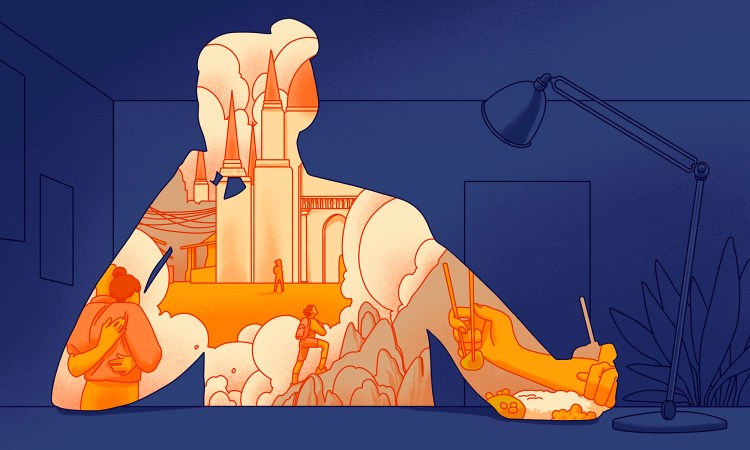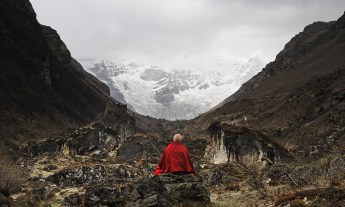
Enjoy acquiring new skills and putting them into action? Well, we’ve got just the thing for you lifelong learners: TED Courses! These new four-week courses offer enriching experiences that help you build tangible skills and brighten your future. Find out more here.
You’ve just walked in the door after your latest adventure.
And whether it was a day trip or a weeks-long voyage, turns out there are ways to make it last a lifetime.
One of the keys to a life-changing journey, says celebrated travel writer and TED Course instructor Pico Iyer, is what you do with it afterwards. This means taking the time to unpack your experiences, and not just your suitcases.
“It’s only when you get back home that you can really begin to understand a trip and implement the changes it may have set into motion inside you,” says Iyer in a lesson from his TED Course on “how to take a life-changing journey.”
To make the most of your travels, he suggests asking yourself three questions when you return:
Question 1: “What moved me most over the course of my trip?”
“For me, it’s nearly always the differences in other cultures that ultimately toll most deeply inside,” says Iyer.
Think about what stood out to you on your trip.
When did you feel moments of joy, wonder, excitement or longing? What are some of the things that you experienced on it that you rarely or never experience in the same way at home?
Was it being face-to-face with natural beauty, like craggy caverns, clear waters or sunny fields?
Or was it something more human, like murals made by local artists, buzzing street markets or nightlife, or crowds of school kids in distinctive uniforms?
Or was it coming face to face with the weight of history in the form of ancient structures, winding streets or time-worn sculptures that connected you to the humans who lived long ago?
Question 2: “What surprised me most on my trip?”
In a trip to Antarctica, Iyer was stunned by unforgettable vistas that were unlike anything he’d encountered. “The vast silences, the colonies of penguins in the snow, the thousand shades of silver,” he recalls. “They were all beyond anything I’d seen or even imagined.”
On your trip, what caught you off guard or made you stop in your tracks?
For Iyer and Antarctica, it was the unimaginable beauty combined with the realization that he and other travelers were contributing to its erosion. He says, “In recent decades, significant steps have been taken to protect that environment. Only smaller ships are permitted to take visitors ashore and the number of people on shore at any time is very strictly limited … But still, we’re damaging the environment just by flying down there.”
Which leads to the final question.
Question 3: “How might my trip move me to think or live my life a little differently?”
Now this is the question that puts the “change” in “life changing.” For example, reflecting on his trip to Antarctica, Iyers asks: “How will we live differently in the light of what we saw there? How much can the strengthened sense of responsibility that arises from witnessing that grandeur offset the cost of traveling around it?”
Perhaps a “strengthened sense of responsibility” might motivate you to do things differently in your daily life — to bike instead of drive, cut down on plastic or volunteer for a clean-up.
But your response doesn’t need to be so literal or direct. Maybe sitting in a sculpture park on your trip will inspire you to notice the shapes of the trees in your yard. Or the colors of the city where you stayed will inspire you to wear a shirt in a particular shade of blue. Or the midday siesta that was common in the country you visited will make you prioritize rest.
“Promise yourself 20 minutes every day to ensure that the journey doesn’t get lost,” says Iyer. “How might you act differently now? Ask yourself how your life is rich in ways you hadn’t imagined before [and] ask yourself how it’s poor.”
Just keep thinking about these three questions — and there’s no predicting what you could learn, how you’ll grow or who you might become.
Go to the TED Courses site to sign up for Pico Iyer’s “How to take a life-changing journey,” where you’ll also learn how to set an intention and choose a destination; how to be fully present while you travel; and how to appreciate and navigate cultural differences.
Plus: While you’re there, check out our other courses, including how to boost your brain and memory with neuroscientist Lisa Genova, nurture your imagination with creatives Charlie Jane Anders and Wanuri Kahiu, and reshape your career with Manoush Zomorodi.
Watch Pico Iyer’s TEDGlobal Talk here:











